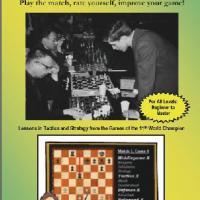
Assessing you skills while 'battling' Bobby Fischer
Improve your Chess via Active Learning
ACTIVE LEARNING is any strategy that involves students in doing things and thinking about the things they are doing (*)
The overall strength as well as strength and weaknesses pertained to various aspects of chess can be determined by evaluating your decision making in critical situation. In my training, I artificially design these situations (by carefully selecting and sometimes modifying positions that had occurred before) and then test my students as well as teach them through these tests. Another bonus of this method is efficiency - when my students work through each example, their skills are assessed for more then one area of chess. Consider the following position from my book Chess Exam Matches You vs. Bobby Fischer.
Imagine this - you are facing a very challenging opponent whose rating is several hundreds points higher than yours. You manage to stay competitive and arrive to the following position, in which your opponent just recaptured the N and is attacking your Q. The position is anything but quiet, and you have many options to consider. Which one would you pick? How do you feel about the position?
 |
|
||||||||||||||||||||||||||||||||||
|
#4. After 19...Rd8x(N)d5 |
|||||||||||||||||||||||||||||||||||
STOP - The answer is below.
Assessing you skills while 'battling' Bobby Fischer
It is very important that you seek the best move and assess the position correctly while disregarding the difference in ratings between you and your opponent. As long as you play well, you can succeed even against a much higher rated opponent.
|
#4. After 19...Rd8x(N)d5 |
In this case, the dynamics of the position are outweighing the static aspects (i.e. White's slightly better pawn structure). The first move to consider here is the immediate 19.Qxd5. You must take a very careful approach and calculate this move thoroughly. If it works, you win a R at the minimum, hence you can spend as much time as you need checking this move. Unfortunately, it works only if Black cooperates: 19...Pxd5?? 20.Rxc8+ Bf8 21.Bh6 and White wins. Instead, Black can interject with 19...Qxe3+ and then capture the Q, winning the game. Hence, White must think defense and not counterattack. In view of the weak e3-B, the Q can only go to e2 or f2. 19.Qe2 looks counter-intuitive as it allows the pin that can't be resolved. After 19...Re8 Black should eventually achieve a victory. Finally, the modest 19.Qf2 addresses all the threats and enables White to play a balanced position with no weakness. Black has weak Ps on the Q-side, but compensate this by more active pieces. The position is approximately equal.
|
Will you be able to get a positive result in this game after playing 19.Qf2 against someone much higher rated, Bobby Fischer for example. Probably, but certainly you will have a good chance, because you assessed the position properly and played the best move. You will have no chance if you picked another move, or believed that after 19.Qf2 your position is bad.
Back to helping you assess your skills - out of 13 categories which are assessed in the book, your score for this position applied to 5 – Middlegame, Tactics, Defense, Equal positions, Sacrifice. This position may seem not too difficult, but as you can see from the score distribution (link below) only 59% of those tested picked the correct combination (B-B).
See how I presented this position in my book - click here Position #4.
If you own the book, please let me know your thoughts.
==============================================================================================
Summary:
Try to evaluate judiciously how you perform in critical positions. Further classification of these positions can help you identify areas that need immediate improvement. Stay focused, evaluate your options carefully and be positive. Good luck!
==============================================================================================
For comments or permission to reprint please send inquires via email or this form
 |
Special offer: Chess Exam You vs. Fischer: Autographed and Personalized (when requested), 2011-2012 Chess Cartoon Calendar ($8) + Free Shipping via Insured Media Mail - (orders of over $50) $10.00(click to buy). You can also order it on Amazon. |
(*Bonwell, C., & Eison, J. (1991). Active learning: Creating excitement in the classroom (ASHE-ERIC Higher Education Report No. 1). Washington, DC: George Washington University, p. 2)
